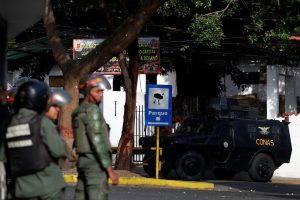
By Mayela Armas and Brian Ellsworth
CARACAS (Reuters) – Venezuela has captured a group of military officers who stole weapons and kidnapped four officials on Monday, the government said, hours after a social media video showed a sergeant demanding the removal of President Nicolas Maduro.
An unspecified number of officers early on Monday attacked a National Guard outpost in the Caracas neighborhood of Cotiza, a kilometer (0.6 mile) from the presidential Miraflores palace, where they met “firm resistance,” the government said in a statement. Witnesses reported hearing gunshots at about 3 a.m. (0700 GMT) in the area.

An armored vehicle is seen outside an outpost of the Venezuelan National Guards during a protest in Caracas, Venezuela January 21, 2019. REUTERS/Carlos Garcia Rawlins
Protesters later burned trash and a car outside the outpost, where the officers were arrested, in a sign of growing tensions following Maduro’s inauguration to a second term that governments around the world have called illegitimate.
Though the incident signals discontent within the armed forces, it appeared to involve only low-ranking officers with little capacity to force change in the hyperinflationary economy as many people suffer from shortages of food and medicine.
“The armed forces categorically reject this type of action, which is most certainly motivated by the dark interests of the extreme right,” the government said in a statement read out on state television.
Maduro was inaugurated on Jan. 10 under an avalanche of criticism that his leadership was illegitimate following a 2018 election widely viewed as fraudulent, with countries around the world disavowing his government.
Opposition leaders and exiled dissidents have called on the armed forces to turn against Maduro, which the president has denounced as efforts to encourage a coup against him.
The opposition-controlled congress’s head, Juan Guaido, said the uprising was a sign of the armed forces’ depressed state of mind. Congress was committed to offering guarantees to officers who helped with “the constitution’s reconstitution,” he said, though he did not want the military to fall into internal conflict.
“We want it to stand as one man on the side of the people, the constitution, and against the usurpation,” he said on Twitter.
In the videos that circulated on Twitter, a group of armed soldiers stood in darkness apparently at the Cotiza outpost while their leader addressed the camera and called for Venezuelans to support their revolt.
“You all asked that we take to the streets to defend the constitution. Here we are. Here we have the troops. It’s today when the people come out to support us,” said the man in the video, who identified himself as Luis Bandres.
The government said the men took two vehicles from a police station in the Macarao district in the west of Caracas before driving to a barracks in the eastern Petare slum, where they stole an arms cache and kidnapped four officials.
After they attacked the Cotiza outpost in the early hours of the morning, security forces surrounded them. In response, several dozen residents barricaded streets and set fire to rubbish as they chanted “Don’t hand yourself in,” according to Reuters witnesses. Troops fired tear gas to disperse them.
“These soldiers are right to rise up. We need a political change, because we don’t have any water or electricity,” said Angel Rivas, a 49-year-old laborer at the protest.
The United States and many Latin American nations say Maduro has become a dictator whose failed state-led policies have plunged Venezuela into its worst ever economic crisis, with inflation approaching 2 million percent.
Maduro says a U.S.-directed “economic war” is trying to force him from power.
(Additional reporting by Vivian Sequera and Corina Pons; Writing by Brian Ellsworth and Angus Berwick; Editing by Marguerita Choy)






